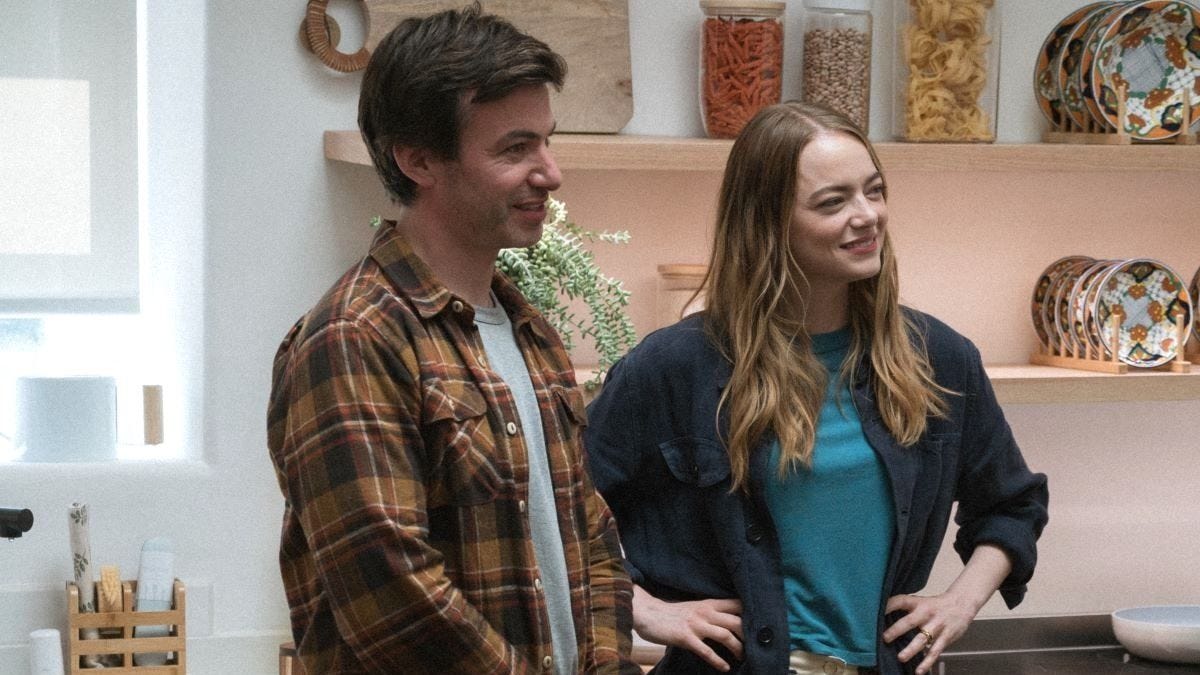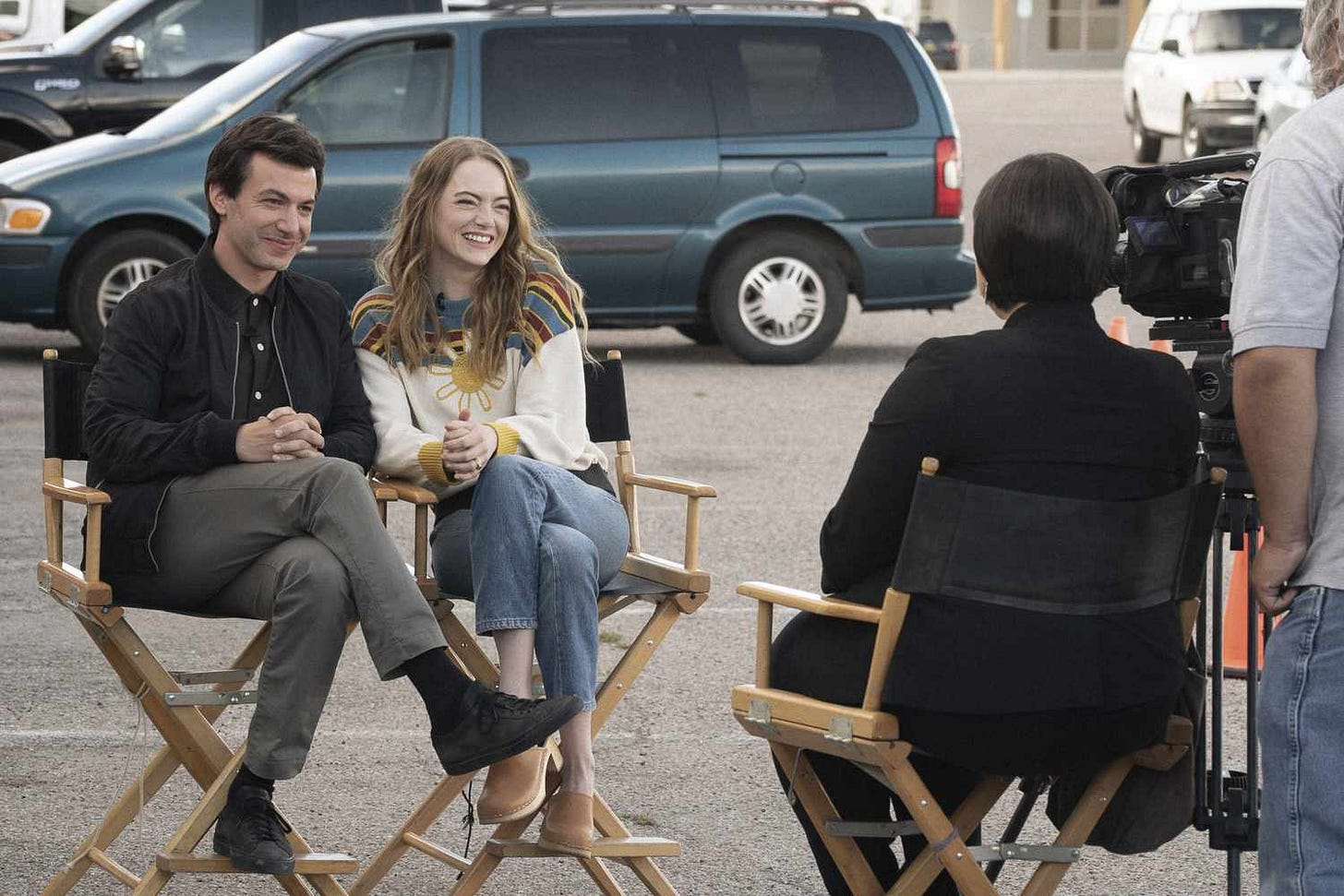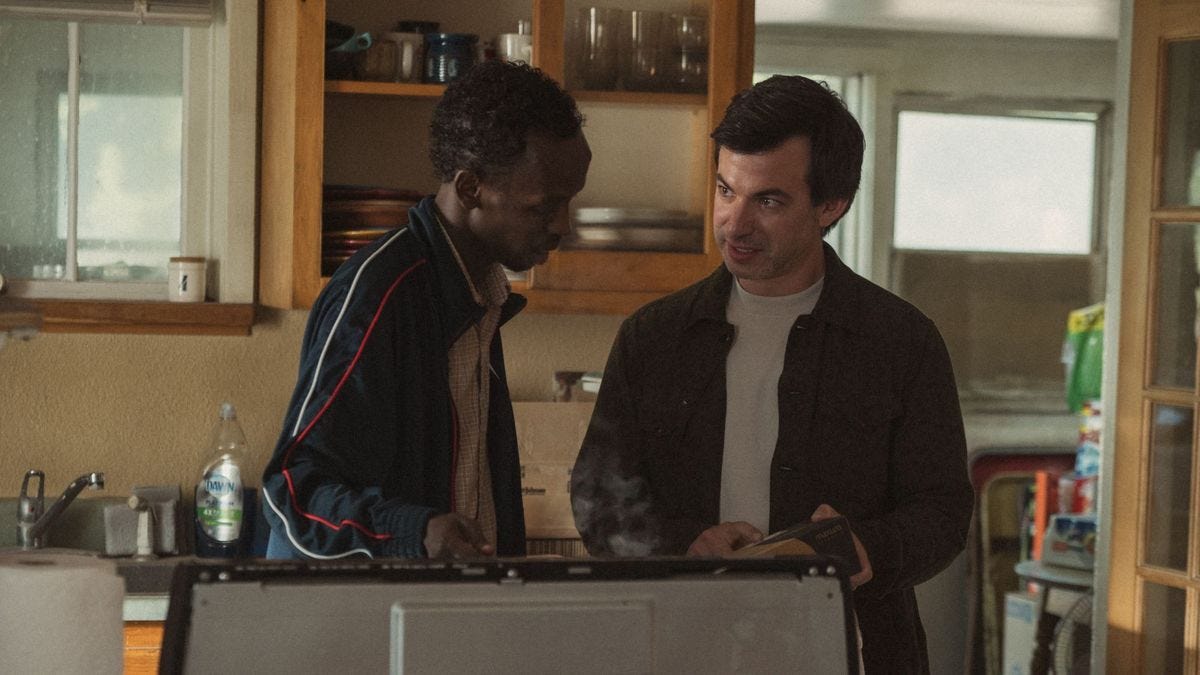An audience can only get so uncomfortable… Right?
From the moment news about this series broke almost four years ago to the month, The Curse raised every eyebrow in the independent film-supporting, A24-merch-buying, cringe-reveling fanbase made of early twenty-somethings — mine included. Co-created by Nathan Fielder and Benny Safdie, this limited series put out by Showtime brings together two of the biggest names in the business of making an audience uncomfortable and, combined with the acting talent of Emma Stone, makes for one of the most unique shows since Twin Peaks.
For Fielder, his (mostly) unscripted Comedy Central show Nathan for You, which ran from 2013 to 2017, specialized in extracting the comedy from the awkwardness he brought to the table through his ridiculous schemes to “help” small businesses. Since Nathan For You ended, Fielder took time to evolve, resulting in HBO’s The Rehearsal, which premiered in 2022 and has been renewed for a second season.
In The Rehearsal, audiences were treated to what can only be described as “Nathan unleashed.” It hits similar notes as his previous effort, dialing in on uncomfortable situations and the theme of loneliness. However, it surprised fans by taking a deeper, more philosophical look at the behavior of both others and Fielder himself. Although The Rehearsal was presumed by some anticipating its premiere to be a similarly hilarious display of the zany real-life people Fielder encountered in his other show, its high concept storyline — which centers around preparing real people for significant moments in their life through elaborate methods, hence the show’s title — showed audiences another side of Fielder, one that could be taken more seriously. Continuing to show off his diverse skill set — from acting to writing, directing and producing — Fielder once again goes all-out and does not hold back on making the audience squirm in their seats with The Curse.
Meshing his talents with Safdie may seem a little odd at first glance, but after viewing the first episode of The Curse, it becomes clear that this is a match made in heaven. Safdie’s films Good Time and Uncut Gems, which he co-wrote and -directed with his brother Josh, quickly left an imprint on the independent film community, marking them as the masters of movies that stir up anxiety. (The latter received more mainstream acclaim partly because of Adam Sandler’s lead performance — his best since Paul Thomas Anderson’s Punch-Drunk Love almost 20 years prior.) However, as great as these shows and films are, their styles can take a lot out of a viewer, and The Curse takes this to a whole other plane of existence.
The Curse puts the audience’s tolerance for discomfort to the test. It does not hide this, with the very first scene of the show being an indicator of the show’s tone and how far it’s willing to go content-wise. In just a few minutes, the audience learns a good deal about the three main characters played by Fielder, Stone and Safdie. We’re tipped off to the parody elements of the story, the instability of the central couple — one-year-married Asher (Fielder) and Whitney (Stone) — and the behind-the-scenes manipulation on the part of Dougie (Safdie). These relationships develop with a tremendous amount of ups and downs and the series only gets more intense as it progresses.
The title of the series refers to the “curse” Fielder believes has been put on him by a young girl who he (sort of) cheats out of $100 after putting on a charitable, nice-guy front for the cameras shooting the HGTV show centered on his and Whitney’s efforts to benefit the community of Española, New Mexico. Just as the audience continues to ask themselves whether the curse in question is real or not as the show goes on, we’re also tasked with questioning whether our main characters are “good people” or not. Not only is this something that the show seems to be prompting the viewer to constantly think about but we also feel an obligation to choose a side so we know who to root for and against. In reality, the audience does not have to separate the characters into these two unfairly broad categories but we’ve been conditioned as television watchers to do so, which only makes the show increasingly uncomfortable when even more problematic decisions are made by the main characters.
As difficult as it is to discuss the show’s plot without giving away details, the specifics don’t matter all too much in the grand scheme of convincing someone to give the show a chance. Whether you like the show or not completely depends on how you react to its tone, as well as your ability to not get overly anxious while watching something. The fact that the show is more concerned with “feel” is clear, as reflected in its audience ratings. Although the show has mostly been commended for its creativity by critics, audiences have largely struggled to share this perspective. As of the day the finale was released, January 12, the show’s overall rating on IMDb stands at a disappointing 6.8/10 by 4,500-plus users. However, I highly doubt Fielder, Safdie and their team were surprised by this reaction; the show is polarizing from the get-go.
As time goes on, it’s more than likely that the show will gain more mainstream appreciation, especially concerning the stellar lead performances by Fielder, Stone and Safdie. Portraying Asher, Fielder, who is ingrained in the brains of those familiar with him as the “king of cringe,” shows that he is capable of playing a character who has many complex layers, primarily that of being constantly unsure of himself. Some comedic moments harken back to Fielder’s trademark style but others leave you concerned about whether you should be laughing or not; sometimes the parody gets too real and you’re left confused. To put it lightly, this is a confusing show, but it’s confusing for all the best reasons and leaves you guessing and wanting more. At the start, Whitney and Asher seem committed to their initiative to create their eco-friendly homes, but as the story continues to unfold, their intentions become unclear to even themselves. It gives off that same feeling of working extremely hard on a project but then, six months in, thinking to yourself: “Do I even want to do this?”
Stone makes a case for being the best actor of the year, regardless of gender. With The Curse and Yórgos Lánthimos’ Poor Things, Stone shows that her range is beyond compare among her generation. She takes on a very difficult role in The Curse. Whitney is arguably the most sympathetic of the three central characters given that she’s been misguided in her genuine desire to help. Certain scenes show the audience her authenticity, making her more likable, but we’re still aware of the capitalist “white savior” complex on display, which is clearly an intentional message with the land’s natives playing a significant part in the story. However, it is not as clear to her, as her ideal TV couple image has blinded reality in some ways. As Whitney, Stone has to juggle marital, parental and personal troubles. Whitney, Asher and Dougie all have perceptions of themselves that are skewed in some way and, as an audience, we are exposed to more of their personalities both directly and indirectly; through themselves and others. Safdie’s role as Dougie is challenging as well since he is antagonized the most out of the trio from the start. As the series goes on, we’re given more reasons to sympathize with him but I never got over to his side, and if I did, I would’ve felt fooled after what happens in the finale.
The final episode of The Curse, “Green Queen,” is one of the most unique, inventive and overall greatest pieces of television I’ve seen in recent memory — certainly of the last five years. It keeps in line with the unpredictability of the show by pulling a stunt that even the most brilliant analysts couldn’t have seen coming. The episode makes Uncut Gems seem like a relaxing spa and is perhaps the most anxiety-inducing piece of media out there. Fielder’s direction shines through in this episode — even more so than it did in previous episodes — and his and Stone’s performances are incredibly believable and heartbreaking. There were times during the finale when I honestly felt like I was forgetting to breathe, and my hand was on my forehead with my mouth agape for 45 straight minutes — really.
The way the show is shot is incredibly effective, making you feel like you’re an undercover agent peering into the lives of these troubled people. This works well thematically when paired with the documentary crew featured, given a good amount of the show takes place on a set of Asher and Whitney’s show. Fielder and Safdie are a directing and writing team that made this show work better than anyone else could have done, which makes sense considering not many other minds could’ve come up with the idea for this show to begin with.
The Curse is tragic, thrilling, funny and, yes, extremely uncomfortable, but above all, it is unpredictable. Contrasting its surprise factor with the couple’s show within the show, which is a jab at the assembly line HGTV programs, it turns a world full of repetition — which Whitney wants to be perceived by viewers of her show as being a part of — on its head. Adding all these aspects together, what Fielder and Safdie have made is one of the most interesting shows or films I’ve seen in the past few years.
1/12/24







